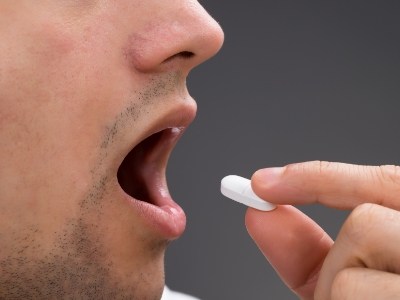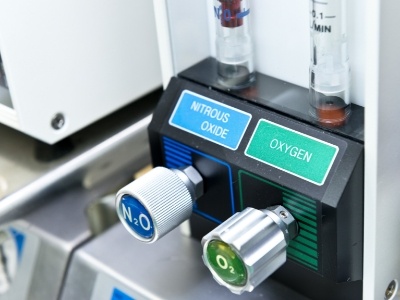Sedation Dentist – Encinitas, CA
The Experts at Helping You Relax
Dental fear and anxiety are common reasons why patients avoid visiting the dentist for important treatments and routine preventive care. Unfortunately, this can lead to declining oral health and the need for more invasive treatments down the road, only exacerbating the anxiety that comes along with visiting your dentist. Dr. Greg McElroy is certified in conscious sedation dentistry in Encinitas, allowing him to help you relax while you’re in the treatment chair. We also bring in an anesthesiologist for those who require more extensive treatments or with severe dental phobia.
Why Choose McElroy Smiles by Design of Encinitas for Sedation Dentistry?
- General Anesthesia Administered by Anesthesiologist
- Dentist Certified in Conscious Sedation
- Friendly & Professional Dental Team
IV Dental Sedation

Dr. Greg McElroy is one of the few dentists who perform IV sedation himself, as he has received additional training and is certified in this service. If you get nervous about dental appointments, and nitrous oxide or oral conscious sedation hasn't helped you feel completely at ease, IV sedation may be the solution you're looking for. It’s more powerful than mild sedation yet less intense than general anesthesia, making it ideal for patients with dental anxiety. To learn more about this option, continue reading.
What Is IV Dental Sedation?
IV dental sedation is a fast-acting sedative that’s administered directly into the bloodstream and can be adjusted throughout your treatment, ensuring you’re consistently receiving the proper amount of medication. Often called "twilight" sedation, it keeps patients conscious but deeply relaxed, typically without any memory of the procedure. While under sedation, your vitals (i.e., blood pressure, oxygen, temperature, and heart rate) are closely monitored by the dental team.
All in all, IV sedation dulls the senses, making the experience more comfortable. However, it doesn’t completely eliminate pain. Because the effects can linger for the rest of the day, you’ll need to have a trusted friend or family member prepared to drop you off and pick you up from our office.
Who Is a Good Candidate for IV Dental Sedation?
Since each patient is unique, we’ll take the time to review your medical history before recommending IV sedation. For example, pregnant women or individuals with specific medication allergies may not be suitable for this option. However, you might be a good candidate for IV sedation if:
- You experience anxiety or fear when visiting the dentist
- You need to undergo a complex or lengthy procedure
- You have a strong gag reflex
- You have difficulty getting numb
The Benefits of IV Dental Sedation
By choosing IV sedation, you can look forward to many incredible benefits, such as:
- Deep Relaxation: Prevents traumatizing dental memories and reduces the risk of overstimulation or phobia, encouraging return visits.
- Quick Effects: Administered directly into the bloodstream, the sedation takes effect rapidly.
- Controlled Medication: Our dental team can adjust the medication flow throughout the treatment, offering greater control than oral conscious sedation.
- Improved Oral Health: Helps those with overwhelming fear or anxiety receive necessary dental treatments, enhancing overall oral health.
Oral Conscious Sedation

We also offer oral conscious sedation for those who have mild to moderate dental anxiety. Administered in the form of a single pill, this medication can help you feel calm and at-ease while you are undergoing treatment. You might even drift off to sleep! Just like with IV sedation, the effects of oral conscious sedation can last for several hours, so it is important to be prepared to have someone pick you up from your appointment.
What Is Oral Conscious Sedation?

Instead of using needles or a mask to administer sedative medication, oral conscious sedation involves the use of a single pill, which you should swallow shortly before your treatment begins. The specific medication can vary, but Valium, Ativan, and Halcion are commonly used for dental sedation purposes.
The effects should start to kick in within 15 minutes or so. You can expect to feel relaxed, calm, and even somewhat drowsy as our team performs your treatment.
How Does Oral Conscious Sedation Work?

Oral conscious sedation is fairly powerful. Since it can compromise your ability to drive safely, it is important that you have a trusted adult ready to take you home from your appointment. It is also worth noting that even though oral conscious sedation will not “knock you out,” it might make you drift off to sleep. You should remain easy to awaken with gentle stimuli.
After the sedation wears off, you might not have any memory of what happened during your appointment. Many patients like this mild amnesiac effect because the sights, sounds, and sensations of dental treatment can make them feel uncomfortable.
Are You a Good Candidate for Oral Conscious Sedation?

You may be a suitable candidate for oral conscious sedation if:
- You struggle with mild to moderate dental anxiety or fear.
- You have a very sensitive gag reflex.
- You have a medical condition that makes it difficult for you to sit still for long periods of time.
- You must undergo multiple or complex procedures in a single appointment.
- You are not easily numbed by local anesthesia.
- You do not have any counterindications that would make oral conscious sedation unsafe for you. For example, it is not typically recommended for pregnant individuals.
Nitrous Oxide Dental Sedation

Did you know that nearly 60% of people experience some level of anxiety about dental care? Fortunately, Dr. Greg McElroy understands this common concern and offers an effective solution: nitrous oxide sedation. With this medication, he can help you instantly feel at ease in the dental chair. Whether you're nervous about your first checkup in a while or need extensive work done in one appointment, we can help. Continue reading to learn more.
Who Is a Good Candidate for Nitrous Oxide Dental Sedation?
You may be a good candidate for nitrous oxide if you're feeling even a hint of nervousness about your upcoming dental appointment. It's typically recommended for patients experiencing:
- Dental anxieties or fears
- Sensitivity in teeth or gums
- A sensitive gag reflex
- Difficulty keeping the jaw open
- Neck or back pain
- Trouble remaining still
- Special needs
It’s worth noting that nitrous oxide isn't recommended for pregnant patients or those with high blood pressure. Certain medications or medical conditions may also pose risks, so discuss your medical history with Dr. McElroy beforehand.
How Does Nitrous Oxide Dental Sedation Work?
Nitrous oxide sedation is incredibly fast-acting and a great option for those with mild dental fear, a strong gag reflex, or overstimulation that prevents dental appointments from being comfortable. At the beginning of your treatment, we’ll place a small nose mask onto you that will allow you to breathe in a colorless, odorless gas mixture. The effects of the sedation will immediately kick-in, helping your body and mind feel relaxed throughout your treatment. After your procedure, we’ll remove the mask and have you breathe pure oxygen. This will minimize any chances of side-effects and allow you to carry on with your day as you normally would.
Aftercare for Nitrous Oxide Dental Sedation
The effects of nitrous oxide sedation wear off quickly after the nasal mask is removed. However, patients should remain at the office until they feel back to normal to ensure safe driving. Once the drowsiness fades away completely, they can resume their regular activities like work or school afterward. Be sure to follow specific recovery instructions from Dr. McElroy to promote ideal post-procedure comfort and healing.
General Anesthesia

For extensive surgeries and other treatments, we offer general anesthesia, also known as sleep dentistry. During this period, you will be completely unconscious, meaning you won’t feel any pain or remember any part of the treatment when you wake up. We bring in a board-certified anesthesiologist to administer this service. This ensures that your treatment is as safe as possible and that you can receive the care you need from a capable and highly experienced team whom you trust.
Who Is a Good Candidate for General Anesthesia?
General anesthesia is quite powerful, so we do not recommend it for everyone. It may be right for you if:
- You struggle with extreme dental anxiety.
- Other forms of sedation have previously proven to be inadequate for you.
- You need to undergo very extensive dental treatment.
- You are in fair overall health. Certain medical conditions, such as some respiratory issues, heart conditions, and pregnancy, can make it inadvisable for patients to be put under general anesthesia.
After we take a thorough medical history and learn about the details of your case, we can determine if general anesthesia is suitable for you.
How General Anesthesia Works
General anesthesia may use a combination of inhaled sedatives and intravenously administered medications. Unlike other forms of dental sedation, it does cause unconsciousness, which is why it is sometimes referred to as “sleep dentistry.” It is similar to what you would experience when undergoing major surgery in a hospital, though it may not be quite that powerful.
Our team takes every safety precaution to minimize the risk of complications. That is why we partner with a board-certified anesthesiologist and closely monitor patients during procedures.
General anesthesia can take up to a full day to wear off, so you should plan some downtime after your appointment. As long as you are still recovering from it, you should not drive or engage in other potentially dangerous tasks.
The Benefits of General Anesthesia
General anesthesia has some significant benefits:
- It may allow you to undergo treatments that would otherwise be impossible for you to endure.
- It is powerful enough to help patients who struggle with very severe barriers to treatment, such as extreme phobias.
- It can make your procedures as efficient and comfortable as possible.
- You will not remember anything about your procedure after it is finished.
- When general anesthesia is administered by a qualified team, it is a low-risk technique.
Sedation Dentistry FAQs
Is sedation dentistry covered by insurance?
Typically, sedation dentistry is considered a “luxury” and, therefore, isn’t covered by dental insurance. There are some exceptions, of course. If you need extensive dental care, like multiple tooth extractions, or you have a condition that makes it impossible to get the treatment you need without it, then your provider may cover the cost. Ultimately, the best way to find out what is and isn’t covered is by reviewing the fine print on your plan.
Is sedation dentistry worth it?
After learning that you may need to pay for a portion of the cost (or the entire cost) of sedation dentistry, you might be wondering if it’s really worth the investment. If you struggle with dental-related anxiety, you experience head/neck/jaw pain in the treatment chair, or you have a sensitive gag reflex, then the answer is “yes!” Even mild forms of sedation, like nitrous oxide, can make an immense, positive difference – whether you’re getting a routine cleaning or essential restorative care.
Does dental sedation make you tell secrets?
There is a common misconception that sedation dentistry makes you tell secrets, which largely stems from how it’s portrayed in TV shows and movies. The reality is that it’s not a “truth serum.” So, it’s very unlikely that you will say anything you normally wouldn’t or reveal a deep, dark secret.
Does dental sedation put you to sleep?
Although sedation dentistry is sometimes referred to as “sleep dentistry,” only general anesthesia will put you to sleep. More mild forms, like nitrous oxide, will simply alleviate your anxiety, allowing you to relax comfortably in the treatment chair while we work on maintaining, restoring, or enhancing your smile. If you do end up dozing off because you’re so calm, don’t worry – we can easily wake you.
Will I remember anything with dental sedation?
If you receive general anesthesia, then you’ll be fully unconscious and won’t remember anything. However, even more mild forms of sedation dentistry have a bit of a memory loss effect. This is great for patients who struggle with nerves, stress, and anxiety because it helps create a more positive association with dental care.
How long does dental sedation last?
That depends largely on the type of dental sedation you receive. After all, the effects of nitrous oxide wear off within five minutes while the effects of oral conscious sedation can last for the rest of the day. That’s why it’s important to arrange for a trusted adult to drive you to and from your appointment if oral conscious sedation is a part of your treatment plan.








